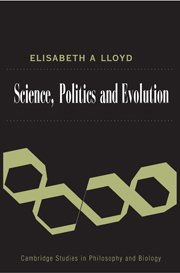Book contents
- Frontmatter
- Contents
- 1 The Nature of Darwin's Support for the Theory of Natural Selection
- 2 A Semantic Approach to the Structure of Population Genetics
- 3 Confirmation of Ecological and Evolutionary Models
- 4 Units and Levels of Selection
- 5 Species Selections on Variability
- 6 An Open Letter to Elliott Sober and David Sloan Wilson, Regarding Their Book, Unto Others: The Evolution and Psychology of Unselfish Behavior
- 7 Problems with Pluralism
- 8 Normality and Variation: The Human Genome Project and the Ideal Human Type
- 9 Evolutionary Psychology: The Burdens of Proof
- 10 Objectivity and the Double Standard for Feminist Epistemologies
- 11 Science and Anti-Science: Objectivity and Its Real Enemies
- 12 Pre-Theoretical Assumptions in Evolutionary Explanations of Female Sexuality
- References
- Index
8 - Normality and Variation: The Human Genome Project and the Ideal Human Type
Published online by Cambridge University Press: 27 February 2010
- Frontmatter
- Contents
- 1 The Nature of Darwin's Support for the Theory of Natural Selection
- 2 A Semantic Approach to the Structure of Population Genetics
- 3 Confirmation of Ecological and Evolutionary Models
- 4 Units and Levels of Selection
- 5 Species Selections on Variability
- 6 An Open Letter to Elliott Sober and David Sloan Wilson, Regarding Their Book, Unto Others: The Evolution and Psychology of Unselfish Behavior
- 7 Problems with Pluralism
- 8 Normality and Variation: The Human Genome Project and the Ideal Human Type
- 9 Evolutionary Psychology: The Burdens of Proof
- 10 Objectivity and the Double Standard for Feminist Epistemologies
- 11 Science and Anti-Science: Objectivity and Its Real Enemies
- 12 Pre-Theoretical Assumptions in Evolutionary Explanations of Female Sexuality
- References
- Index
Summary
Certain issues involving science are widely regarded as ethical or social – the appropriate moral and medical responses to abnormal fetuses, for example. The “concept of abnormality” itself is not usually one of these social or ethical issues. It is assumed that science tells us what is normal or abnormal, diseased or healthy, and that the social and moral issues begin where the science leaves off.
For many purposes, such an understanding of science is appropriate. In this chapter, however, I would like to challenge the “givenness” of the categories of normality, health, and disease. By understanding the differences among various biological theories and the distinguishing features of their respective goals and approaches to explanation, we can analyze the way in which scientifically and socially controversial views are sometimes hidden inside apparently pure scientific judgments.
I am not suggesting that the misleading nature of some of the scientific conclusions I discuss implies some unsavory intention on the part of the scientists involved. On the contrary, my point is that there are sincere scientists working among different theories and subfields, each with their own standards of explanation and evidence. The diversity of theories and models involved in implementing the Human Genome Project provides a unique challenge both to the producers and the consumers of the DNA-sequencing information. I contend that the problems arising from this diversity have not been recognized or addressed.
- Type
- Chapter
- Information
- Science, Politics, and Evolution , pp. 133 - 147Publisher: Cambridge University PressPrint publication year: 2008
- 10
- Cited by



